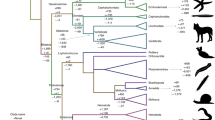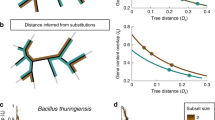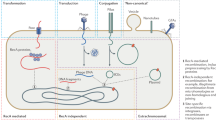Abstract
One of the main conclusions presented by the International Human Genome Sequencing Consortium is that “hundreds of genes appear to have resulted from horizontal gene transfer from bacteria at some point in the vertebrate lineage”1. We noticed that a significant proportion of these human genes have closely related orthologues in the primitive eukaryote Dictyostelium. This observation supports independent gene loss in multiple lineages (worm, fly, yeast, plants) rather than horizontal gene transfer from bacteria.
This is a preview of subscription content, access via your institution
Access options
Subscribe to this journal
Receive 51 print issues and online access
$199.00 per year
only $3.90 per issue
Buy this article
- Purchase on Springer Link
- Instant access to full article PDF
Prices may be subject to local taxes which are calculated during checkout

Similar content being viewed by others
References
International Human Genome Sequencing Consortium. Nature 409, 860–921 (2001).
Roelofs, J. et al. Biochem. J. 354, 697–706 (2001).
Baldauf, S. L. et al. Science 290, 972–977 (2000).
Kay, R. R. & Williams, J. G. Trends Genet. 15, 294–297 (1999).
Author information
Authors and Affiliations
Corresponding author
Supplementary information
Rights and permissions
About this article
Cite this article
Roelofs, J., Van Haastert, P. Genes lost during evolution. Nature 411, 1013–1014 (2001). https://doi.org/10.1038/35082627
Issue Date:
DOI: https://doi.org/10.1038/35082627
This article is cited by
-
Peripheral modulation of antidepressant targets MAO-B and GABAAR by harmol induces mitohormesis and delays aging in preclinical models
Nature Communications (2023)
-
Discovery of a receptor guanylate cyclase expressed in the sperm flagella of stony corals
Scientific Reports (2019)
-
Global identification, structural analysis and expression characterization of bHLH transcription factors in wheat
BMC Plant Biology (2017)
-
Nematode-derived drosomycin-type antifungal peptides provide evidence for plant-to-ecdysozoan horizontal transfer of a disease resistance gene
Nature Communications (2014)
-
Horizontal gene transfer in eukaryotic evolution
Nature Reviews Genetics (2008)
Comments
By submitting a comment you agree to abide by our Terms and Community Guidelines. If you find something abusive or that does not comply with our terms or guidelines please flag it as inappropriate.



